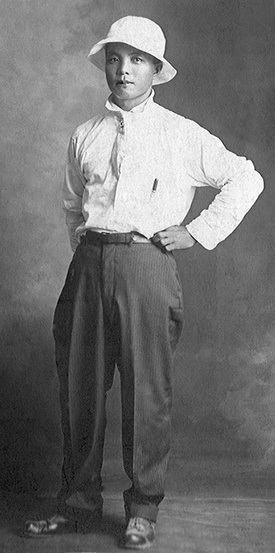Morikami Sukeji, who came to America as a member of the Yamato Colony in South Florida and stayed there alone until the end of his life after the colony was disbanded, continued to write letters to his sister-in-law and her family after the war. While living alone, he talks to his cats. The rain destroys his crops again, but he lives with the help of his American neighbors.
* * * * *
Night of December 10, 1950
Mi-san,
Today is Sunday, and I worked all day. I stayed in bed until nine o'clock and read newspapers and magazines. I didn't see the florist next door today, and I didn't talk to anyone all day. I don't feel lonely.
At times like this, I sometimes talk to my cats. I have five now, but Sweetie, the oldest, understands what I'm saying very well. She responds to every word I say with a meow meow. She's a very clever cat, and when I open a can of meat, she licks the inside of the can as far as her tongue can reach.
It's quite cold tonight. It's 9:05 now, but the temperature inside is almost the same as outside, at 51 degrees Fahrenheit (10.6 degrees Celsius). The new moon is like a sharp sickle covering the entire sky.
From GEO
"Rain again ruins crops"
Month/Day/1950
People in the city who don't know whether potatoes grow on trees or in the ground seem to think that burying the seeds in the ground is enough. However, it is no easy task to deal with the price fluctuations due to rain, wind, pests, and disease.
Four acres of cucumbers and other crops that I had worked so hard to grow over the past month and a half were destroyed by torrential rains three days a week. Three days, nearly a foot of rain, and I spent the whole night with a shovel trying to drain the soil, but to no avail.
Now the rain has stopped and the water has gone, but I can only watch in amazement as the once green crops turn yellow, wilt, and wither. It's the same feeling I had when my beloved child, whom I had raised without sleep at night, was suddenly taken away by illness. I felt like crying, and for a moment I resented the heavens and was angry at the state of the world.
Fortunately, we were able to save 30,000 tometoo and eggplant seedlings (about 10 acres), so we plan to hire a couple of helpers to plant them this week.
The rain has stopped, the sky is cloudy, and there is no wind at night, so it is hot and humid and difficult to sleep. There are a few mosquitoes tonight.
Helping the neighbors
My neighbor's carpenter was preparing the ground for a two-acre vegetable patch, so I helped him out with his new tractor today, even though I was busy. There were a lot of roots, so it took me 1:30 p.m. to finish. I hadn't eaten anything since the morning, so my stomach was starving and my clothes were sticky.
I was thinking, "Miss, I wish you were here," when the carpenter's wife kindly brought me a tray of ham and cheese sandwiches, hot coffee, a dessert of rhubarb and strawberries, and iced water.
I have about six neighbors. They are carpenters, plasterers, milkmen, etc. They are all nice people and kind to me. Human kindness is the same no matter where they are from.
Mi-san, do you like the items I sent you? Also, has the clothing fabric I sent you through Sanyo Shokai arrived? If it hasn't arrived yet or you're not satisfied with the item, please don't hesitate to let me know. I'll get in touch with you right away.
It's almost the middle of August. Day by day things are getting busier. This year, we must achieve good results.
Date: XX/1951
"I want you to send me some Japanese books."
I must meet you as soon as possible. I'm more worried about becoming an old man than about you becoming an old woman. Fortunately, I'm in good health, so there's no need to worry. I weigh 125 pounds (about 56 kilograms). I've lost about five pounds since this time last year, but I'm OK. People who are obese die early.
My friend, who was also overweight, suddenly collapsed from a heart attack about a month ago. We were in the same business and competed with each other for 15 years. He was a very kind man, and 18 years ago, when I had an incision surgery, he came to visit me in Miami, where I was hospitalized, every three days on average, even though he was very busy. He and six other colleagues sent beautiful flowers to a florist in Miami every other day for nearly two months.
This is the beauty of Americans. There is no other race as sneaky and unkind as the Japanese. Of course, there are exceptions.
Dear Mi-san, this letter also talks about the poor economy. I will sacrifice everything and do my best. I know you are also suffering, but please bear with me for a while. Your letter will be an encouragement and a comfort to me. If so, dear Mi-san,
From my brother
(postscript)
Shu-san, could you please send me a copy of "Sinking Shinano" (published by Kobunsha)? Even a used copy will do. I will send you lots of magazines in the near future.
Date: XX/1951
Beauty
Thank you for your letter. I visited Yamauchi-kun in Miami last Sunday. It had been a while since I last spoken Japanese, and he treated me to his favorite vinegared rice. I got home around 11pm. Yamauchi-kun's wife is from Mineyama, Tango, and is a very capable woman. It is unfortunate that her social interactions are naturally limited due to her lack of language skills. There are 20-30 compatriots in the Miami area, but only 5-6 women.
I borrowed the war story "Sinking Shinano" that I had requested, which happened to be in Yamauchi's possession. The 71,000-ton aircraft carrier Shinano (note 1), which took 140 million yen and nearly 10 years to complete before the war, was attacked by enemy torpedoes after only 15 or 6 hours of sailing, and several hundred people... disappeared into the sea off the coast of Kumano.
During World War II, I saw a live-action newsreel of a major Japanese warship being hit by enemy torpedoes and sinking. Over a thousand crew members ran around in confusion on the deck, tilted at 20 to 30 degrees, like a swarm of spiders... Then, with a huge bang, the ship stood upright and sank into the sea with its masts (meaning the superstructures such as masts) high and its battle flag fluttering.
(Note 1) Built in Yokosuka, it was sunk by a torpedo attack from a US submarine while en route to Kure Naval Port in 1944. It was the largest aircraft carrier in the world at the time.
Date: XX/1951
Beauty
I've neglected to contact you for a long time. I'm so sorry. An unexpected accident occurred, and it's a wonder I'm alive today to write this letter. I'll tell you the details in my next letter, but I'm okay, so don't worry.
I'm still broke. 1951 is over in a few weeks. Christmas is coming up, so the city is very lively. The weather is fine, not too hot, not too cold. If only I was healthy and had a lot of money, I'd be happy. But there's no end to greed.
"We won't sell land at a throwaway price"
It's hot, with temperatures reaching over 95 degrees Fahrenheit (35 degrees Celsius) even indoors during the day. The cool breeze blowing in from the ocean makes it easier to bear the heat outdoors.
I went to repair my tractor. I can fix minor problems, but sometimes a mechanic is needed. Machines are like the human body, and no matter how careful you are, sometimes they break down unexpectedly. Unlike cars and trucks, tractors can't go faster than 15 miles per hour, but the roads are wide and flat, so the ride is not bad.
I won't be doing a summer crop this year, and I'm not sure if I'll be doing a fall crop either. But I don't like working for other people, so I'm thinking of growing vegetables and other things for local markets on a very small scale. I won't be able to make a big profit, but I'll be safe with crops for the north.
My land was up for sale, and yesterday someone came to look at it. Nowadays, people who buy land have money, and they take advantage of the recession to buy cheap. Three years ago, the site of a junior high school, which is 30 acres of land, was sold for $1,000 per acre.
I am not selling my 31 acres for a cheap price, as it will soon be a promising home for the wealthy overlooking Lake Ida. I sold it once for $4,000 an acre in 1926, shortly before the economic depression that shocked the whole world. When peace returns, the economy will rebound.
GEO
(※, brackets are author's notes)
Reference: Yamato Colony and Morikami Sukeji. From "Yamato Colony: The Men Who Left Japan in Florida" (by Kawai Ryusuke, Shunposha)
© 2019 Ryusuke Kawai







